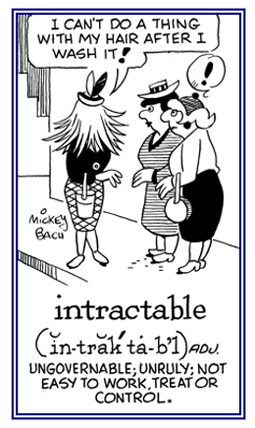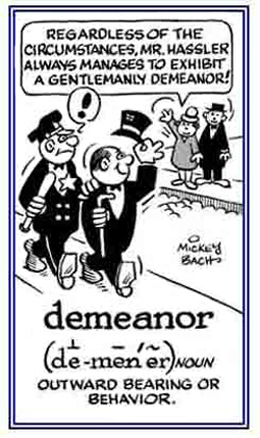The previous lesson discussed words that mean “purposely rude,” but there are also a few words, in the English language, that describe unwitting rudeness: Uncouth, unseemly and boorish. Beyond words that describe rudeness, are adjectives that describe something or someone stubborn or difficult. These words are: Intractable, intransigent, obstinate, and obdurate. Can you think of words to use to describe a person’s mood or appearance?
The previous lesson discussed words that mean “purposely rude,” but there are also a few words, in the English language, that describe unwitting rudeness: Uncouth, unseemly and boorish. All three words are more sophisticated ways of describing inappropriate behavior. People who behave in an uncouth, unseemly, or boorish manner generally don’t realize their behavior is regarded as inappropriate or even rude. Uncouth means, “lacking refinement, culture and taste.” If someone is uncouth, it means the person behaves inappropriately because he or she does not understand proper manners. Unseemly means, “not following rules for what is considered proper and polite in today's society.” Unseemly is often used in the context of an “unseemly remark.” This refers to a comment or remark that seems out of place or inappropriate, given the circumstances. When a famous actress recently used a curse word on national television, it was considered unseemly. Boorish means, “rude and not considerate of others’ feelings.”
People who often act in a rude or vulgar manner, without regard for common courtesy, are considered boorish. One more word to note in this lesson is crass. Crass is another word that is usually used in reference to rude or insensitive comments or remarks. It’s often used to describe jokes that are in poor taste. A boorish person would likely tell a lot of crass jokes.
To recap with some examples: It would be uncouth (rude, ill-mannered) to talk loudly during a wedding ceremony, especially if you were making unseemly (rude) remarks about the bride. In most cultures, it is considered unseemly (impolite, inappropriate) to start eating before everyone at the table is served. If someone were to spend an entire dinner talking loudly about politics, telling crass (vulgar) jokes, and interrupting others, the person could be described as boorish (inappropriate, rude, inconsiderate).
Beyond words that describe rudeness, are adjectives that describe something or someone stubborn or difficult. These words are: Intractable, intransigent, obstinate, and obdurate. Intractable is synonymous with obstinate and obdurate when used to describe someone who is stubborn or resistant to change. Intransigent describes those refusing to change, without exception. Intransigent should be used to describe someone who refuses to change his or her mind and will never compromise. Intractable is best used to describe someone or something wild and rebellious, someone who resists change simply for rebellion. Intractable can also be used to describe a difficult and/or impossible to handle situation. For example: "We have an intractable problem on our hands." Obstinate and obdurate are best used in the context of stubbornness. Obstinate more specifically describes refusing to change or consider other people's recommendations, while obdurate refers more to being stubborn and not moved by emotions. An obdurate person would never bend the rules out of sympathy for some else’s situation. Obstinate is used more commonly and is a great word to describe someone who is generally stubborn or “stuck in his ways.”
Let’s review: Let’s say you asked your brother to quit smoking and he said, “No way! I refuse to consider the idea.” You would say he is stubborn or ---- obstinate. Let’s say your brother was a wild partier and you asked him to drink less, but he refused to reform his wild ways. You would describe him as ---- intractable. Finally, if you begged your brother to quit smoking because you feared for his health and the pain his death would cause the family, yet he still refused, this would be considered ---- obdurate.

Can you think of words to use to describe a person’s mood or appearance? How about demeanor (a word also mentioned in the previous lesson) and temperament: Demeanor refers to a person's outward look and behavior. This is different from temperament, which refers to the part of a person's character that affects his or her general mood and behavior. A person with a fun and lively temperament usually has a fun and lively demeanor, but, if he or she is in a bad mood, the person may have an agitated or unfriendly demeanor. So, temperament refers to general and usual mood, while demeanor refers to someone’s mood at a specific, given time. Temperament is also often used to describe the general personality of an animal: My dog, Brandy, has a great temperament.
To recap with an example: Mary, who has a generally friendly and patient --- temperament, must have been in a bad mood today, because her ---- demeanor was quite abrupt and unfriendly when we spoke this afternoon.
